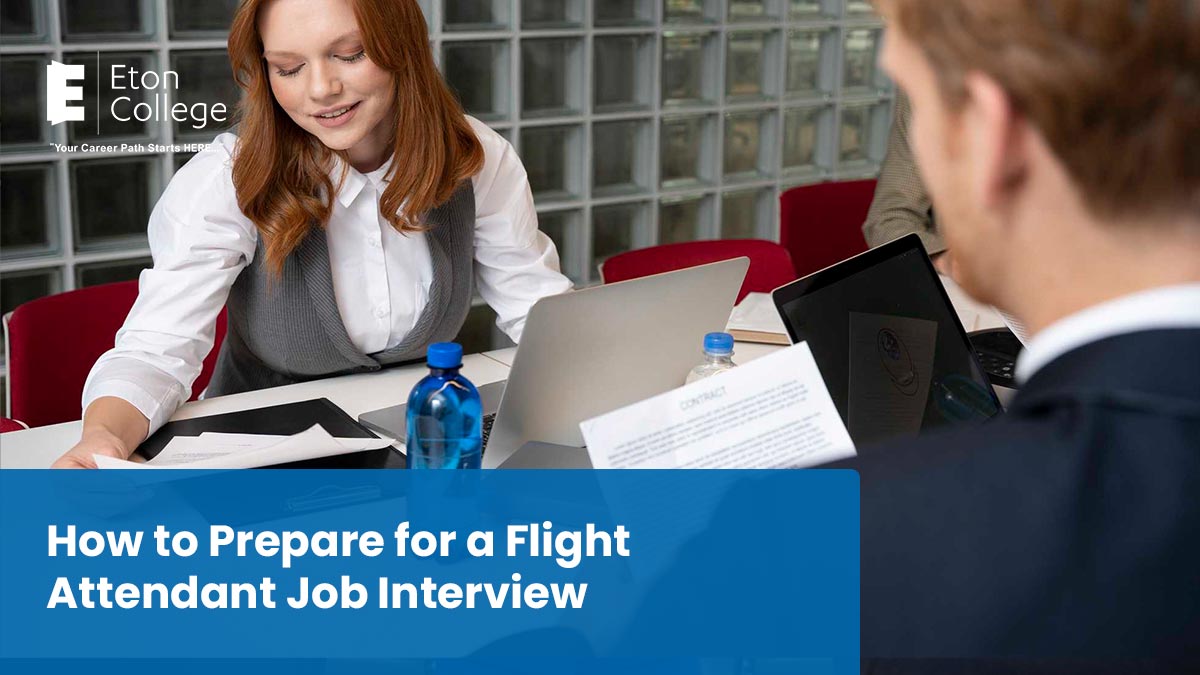- Before attending a flight attendant job interview, familiarize yourself with the airline’s history, mission, and industry trends. This demonstrates genuine interest and helps you stand out.
- Most flight attendant job interviews include group discussions, one-on-one interviews, and a final interview with high-level personnel. Each stage assesses communication, problem-solving, and overall fit.
- Prepare for questions like “Why do you want to become a flight attendant?” and “How would you handle an emergency?” Answering these confidently shows your understanding of the role.
- Flight attendant job interviews require a business formal dress code. Men should wear tailored suits, while women should opt for professional outfits with minimal makeup and accessories.
- Punctuality, politeness, and maintaining a positive attitude throughout the interview process are crucial to making a strong impression.
Landing a flight attendant job is a dream for many, offering the chance to travel the world while providing excellent customer service. However, the journey begins with a crucial step—the flight attendant job interview. Preparing thoroughly for this interview can mean the difference between getting hired or missing the opportunity.
Related:Mock Flight Attendant Interviews: How to Practice for Success
Here’s how you can best prepare for your flight attendant job interview, ensuring that you make a positive impression and stand out as a candidate.
Research the Airline and the Industry
Before heading into your flight attendant job interview, it’s essential to familiarize yourself with the airline you’re applying to and the broader aviation industry. Here’s what you should focus on:
- Airline Background: Learn about the airline’s history, mission, values, and fleet size. Understanding their routes, destinations, and cabin services will show that you’ve done your homework and are genuinely interested in the airline’s operations.
- Industry Trends: Stay up to date on recent developments in the aviation industry, such as new safety regulations, technological advancements, and emerging challenges. Airlines are looking for candidates who are aware of the broader trends affecting air travel.
- Job Role: Make sure you understand what a flight attendant’s job entails, including the responsibilities, required stamina, and specific challenges. Researching the role thoroughly will prepare you to answer interview questions with confidence.
Related:20 Common Flight Attendant Interview Questions
The Flight Attendant Interview Process
The flight attendant job interview process typically consists of multiple stages. While each airline may have a slightly different approach, most interviews follow these general steps:
- Group Discussion: This is often the first stage where candidates are divided into groups to discuss a particular topic. The aim here is to assess your teamwork, communication, and problem-solving skills. It’s important to contribute meaningfully without dominating the conversation.
- One-on-One Interview: This stage usually involves an interview with a representative from the airline’s HR department or cabin crew management. You’ll be asked questions about your skills, experience, and understanding of the flight attendant role.
- Final Interview: If you make it to the final stage, you’ll meet with high-level personnel, such as the HR manager or cabin crew supervisor. They’ll evaluate your overall fit for the airline and make the final hiring decision.
Related:Post-Interview Etiquette for Flight Attendant Candidates
Common Flight Attendant Job Interview Questions
During the flight attendant job interview, you’ll be asked a series of questions designed to assess your qualifications, personality, and ability to handle the demands of the job. Some common questions you can expect include:
- Why do you want to become a flight attendant? This is your opportunity to express your passion for the industry and customer service. Be sure to connect your answer to the airline’s values and mission.
- How do you handle difficult customers? Flight attendants need to remain calm and professional, even in stressful situations. Provide a specific example of how you successfully dealt with a challenging customer in the past.
- What would you do in an emergency situation? Safety is a flight attendant’s top priority. Share how you would follow protocol, remain composed, and ensure passenger safety in an emergency.
- How do you manage long hours and irregular schedules? Being a flight attendant requires physical stamina and mental resilience. Discuss how you manage stress and maintain energy during demanding shifts.
Related:How to Answer Behavioral Interview Questions for Flight Attendant
Presentation Matters: Dress Code and Appearance
First impressions matter, especially in a flight attendant job interview where professionalism is key. Airlines place a strong emphasis on appearance, as flight attendants are the face of the airline. Here are some guidelines for dressing the part:
- Men: Wear a tailored suit, crisp white shirt, tie, and polished shoes. Avoid wearing heavy cologne and ensure any facial hair is neatly groomed.
- Women: Choose a professional suit with a skirt or pants, keep makeup and jewelry minimal, and ensure your hair is styled neatly. The skirt should fall to or below the knee for a more conservative look.
By dressing in business formal attire, you’ll convey the professionalism that airlines expect from their flight attendants.
Related:Pack for Success: Key Essentials for Your Flight Attendant Interview
Insider Tips for Success
Here are a few additional tips to help you stand out during your flight attendant job interview:
- Show Enthusiasm and a Positive Attitude: Airlines value candidates with a friendly and approachable demeanor. Let your passion for customer service and travel shine through during the interview.
- Be Punctual and Polite: Arrive on time, greet everyone warmly, and maintain a respectful tone throughout the interview process. Professionalism is key in this industry.
- Provide Real-Life Examples: When answering questions, use specific examples from your previous work experience that demonstrate your ability to provide excellent service, handle crises, and work effectively in a team.
- Send a Thank-You Note: After the interview, send a thank-you email to the interviewers. This shows your appreciation for their time and reinforces your interest in the position.
Preparing for the Flight Attendant Role
A flight attendant job interview is not just about answering questions—it’s your opportunity to demonstrate your readiness for the role. This involves more than knowing the basics; it requires mental preparation for the demands of long hours, irregular schedules, and the crucial responsibility of ensuring passenger safety.
Related:Dress Code and Appearance Tips for a Flight Attendant Interview
To excel in your flight attendant job interview, you need a combination of thorough research, professional presentation, and a solid understanding of the role’s requirements. Ultimately, your objective is to show that you are the best candidate to uphold the airline’s standards while prioritizing safety and delivering exceptional service.
For those aspiring to become a flight attendant, proper preparation is key. Eton College offers a comprehensive Flight Attendant Preparation Program designed to equip students with the necessary skills and knowledge to excel in the aviation industry. This program provides the foundation you need to succeed in the interview process and beyond. Take the next step toward your dream career and prepare with confidence!




